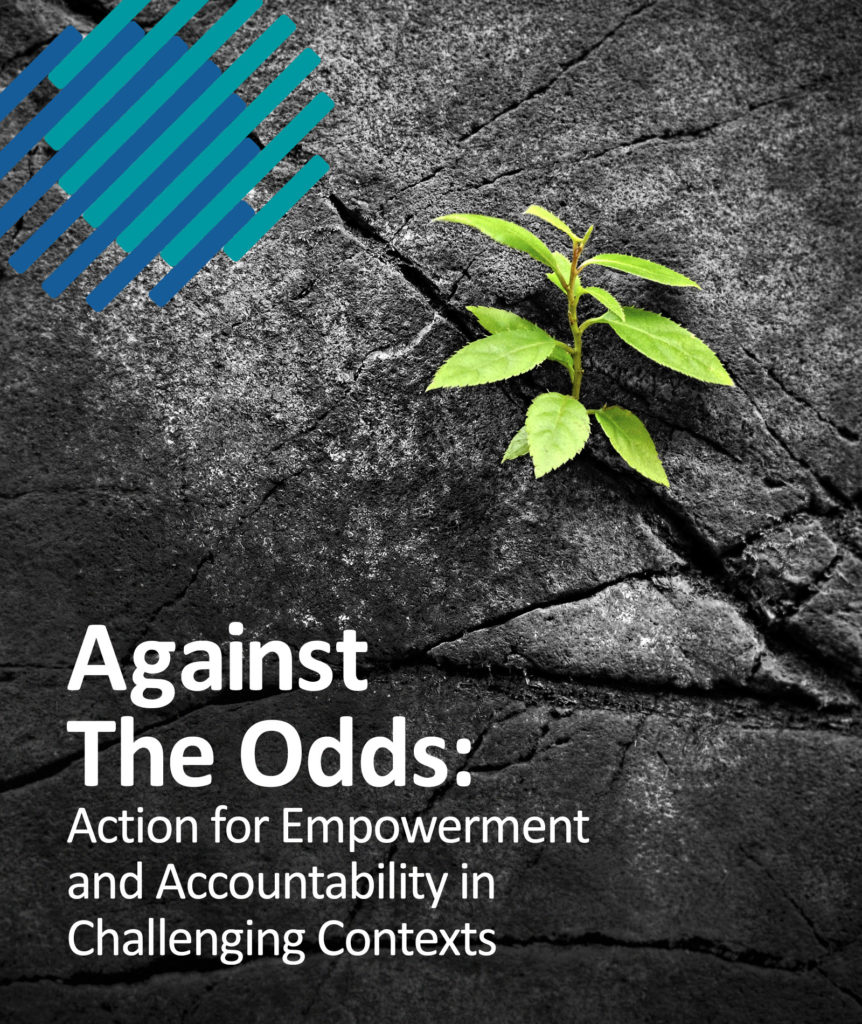“Against the Odds” is a new report released today by the IDS-led Action for Empowerment and Accountability (A4EA) programme. It offers new insights into how people experience governance relationships, mobilise to make claims of authorities, and strategise to demand greater accountability against a backdrop of fragile citizen-state relations.

Launched in 2016, the Action for Empowerment and Accountability (A4EA) research programme was an international consortium led by the Institute of Development Studies and funded by the Department for International Development (DFID), now the Foreign, Commonwealth and Development Office (FCDO).
IDS Fellow and A4EA Director, Professor John Gaventa said, “when we began this work in early 2016, there was an optimism in many places that a governance agenda of transparency, accountability and participation was both growing and making a difference in many parts of the world”.
A4EA deliberately set out to explore how this agenda played out in more fragile settings, especially those affected by legacies of conflict and violence. Its focus countries – Mozambique, Myanmar, Nigeria, Pakistan, and, initially, Egypt – all had some level of democratic opening. But they also had histories of authoritarian and military rule married by ongoing violence in substantial pockets of their nations.
Democratic backsliding, growing authoritarianism and closing civic space
Professor Gaventa added, “Over the five years of our research, the world has changed. Rather than becoming more democratic, with more transparent and accountable institutions, we have seen democratic backsliding, growing authoritarianism and closing civic space. Rather than being fragile exceptions to an otherwise increasingly democratic world, the countries we studied increasingly represent the norm.”
A4EA’s research largely took a ‘citizen-eye’ view to the question of how authority is understood, and how citizens, especially marginalised groups, make claims, express grievances, seek to have their voices heard, and, hold authorities to account. Recognising that formal citizenship itself is often a key source of conflict, “Against the Odds” uses the term citizen in a broad sense to refer to those owed accountability by authorities.
- Download Against the Odds: Action for Empowerment and Accountability in Challenging Contexts
- Watch the video interview with Professor John Gaventa in which shares his thoughts on key findings
Findings in “Against the Odds” report are presented across five thematic areas
A4EA’s final report, Against the Odds: Action for Empowerment and Accountability in Challenging Contexts, presents its findings across five thematic areas. These draw on its large body of work (over 220 outputs) with over 100 researchers and 25 research partners, spanning 22 countries (including the 5 focus countries described above).
- Space for citizen action: closing civic space and increasing authoritarianism combine with legacies of fear and self-censorship to limit opportunities for citizen voice.
- Understanding governance from the margins: taking a ‘citizen-eye’ view from conflict-affected areas and marginalised communities highlights low expectations, the importance of non-state authorities and intermediaries, and active efforts to avoid the state.
- Women’s political participation and collective action: women’s political agency expresses itself in multiple ways, including leadership of social action, although it is also curtailed by gendered social norms at the household level and beyond.
- Citizen-led strategies for empowerment and accountability: despite the obstacles, a rich repertoire of under the radar and more overt citizen action can often be found in these contexts – including through cultural forms of resistance and often intense collective protest – but accountability gains that result are often fleeting.
- Enabling citizen action: it is possible to enable greater citizen engagement in governance in conflict-affected contexts. Such efforts, often supported by international donors, can contribute to long-run gains in empowerment, but the strategies and tactics used, and their interactions, matter.
Implications for donors, governments and civil society organisations
The report also discusses key implications of these findings for donors, governments, and civil society organisations seeking to strengthen empowerment and accountability processes in challenging settings.
It proposes that action for empowerment and accountability in fragile and conflict-affected contexts needs to:
- Understand the political economy of governance from below, using approaches that take a ‘citizen-eye view’.
- Proactively link accountability-focused work with strategies for strengthening fundamental social, political and civic rights.
- Start with bolstering accountability on the issues that matter most to citizens and pay more attention to their choice of tactics.
- Approach accountability as the need to build countervailing power of organised citizens, with a focus on the political agency, organising and networks needed to do that.
- Focus on the building blocks towards the long-run goal of democratic and accountable governance.
- Download Against the Odds: Action for Empowerment and Accountability in Challenging Contexts
- Watch the video interview with Professor John Gaventa in which shares his thoughts on key findings